European Countries With The Most Summer Olympic Medals
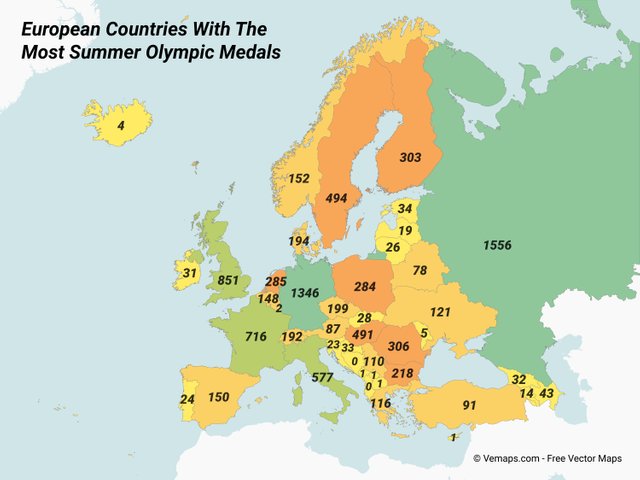
Map by Vemaps.com
Table for Summer Olympic Games from 1896 to 2018 is tabulated below. These Olympic medal counts do not include the 1906 Intercalated Games which are no longer recognized by the International Olympic Committee (IOC) as official Games. The IOC itself does not publish all-time tables, and publishes unofficial tables only per single Games. This table was thus compiled by adding up single entries from the IOC database.
The results are attributed to the IOC country code as currently displayed by the IOC database. Usually, a single code corresponds to a single National Olympic Committee (NOC). When different codes are displayed for different years, medal counts are combined in the case of a simple change of IOC code (such as from HOL to NED for the Netherlands) or simple change of country name (such as from Ceylon to Sri Lanka). As the medals are attributed to each NOC, not all totals include medals won by athletes from that country for another NOC, such as before independence of that country (see individual footnotes for special cases such as combined teams). Names in italic are national entities that no longer exist. The totals of NOCs are not combined with those of their predecessors and successors.
NOCs with medals
The table is pre-sorted by the name of each Olympic Committee, but can be displayed as sorted by any other column, such as the total number of gold medals or total number of overall medals. To sort by gold, silver, and then bronze, sort first by the bronze column, then the silver, and then the gold. The table does not include revoked medals (e.g. due to doping).
Medal totals in this table are current as of the 2016 Summer Olympics in Brazil and all changes in medal standings due to doping cases and medal redistributions up to 1 February 2019 are taken into account.

The sum total of gold, silver and bronze medals are not equal for the following reasons:
- Some sports (such as boxing, judo, taekwondo and wrestling) award or have previously awarded two bronze medals per competition.
- Some tied performances have resulted in multiple medals of the same colour being awarded for an event. If this tie is for gold or silver, there will be a consequent absence of a silver or bronze medal for that event.
- Not all medals which have been revoked have been re-awarded.
- Some early events, such as cricket at the 1900 Summer Olympics had only two entrants.
- Retroactively awarding gold, silver and bronze medals for the 1896 and 1900 games results in some anomalies, such as the 100 metre freestyle swimming event in 1896 where no surviving records distinguish the places of those who finished between 3rd and 10th position.
NOCs without medals
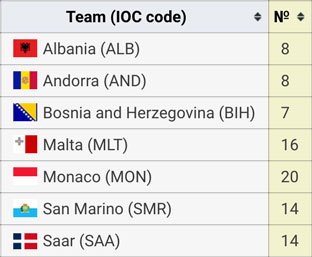
Variations
The sections above are based on information published by the International Olympic Committee. Various sources deal with some of the entries in the preceding sections differently.
Early Olympics
For the 1900 Summer Olympics several countries are credited with appearances that are not considered official by the IOC. Only one of these cases concerns a medal. A gold medal that is officially added to France's total is given to Luxembourg.
Similar cases of disputed nationality affect the 1904 Summer Olympics. France is credited with a silver medal and Norway with two gold medals. These medals are added to the United States.
Other differences from the official table are based on disagreements about which events were Olympic. This affects several of the events in the 1900 and 1904 Olympics. In addition, some sources include the 1906 Intercalated Games when compiling their medal tables.
Alpinism and aeronautics
From 1924 through 1936, the IOC on several occasions awarded gold medals for feats of alpinism and aeronautics that occurred in the preceding four-year Olympiad. In 1924, 1932 and 1936, gold medals were awarded to 25 mountaineers from six nations for expeditions in the Himalayas and the Matterhorn. In 1936, a gold medal was awarded to Hermann Schreiber of Switzerland for crossing the Alps in a glider in 1935, the first time that had been done. Some sources include these IOC awards of gold medals in the overall count.
Germany
Germany has competed under five different designations, including as two separate teams at several Games. Sources vary in how they present the medals won by these teams. The table below shows sourced combinations of these teams, when applied to the updated medal totals from the main table. A part of Germany, Saar, competed independently in the Summer Olympic games in 1952, but failed to win any medals. Due to most lists only listing medal counts, it's possible but not certain Saar was included as part of Germany in their calculations.
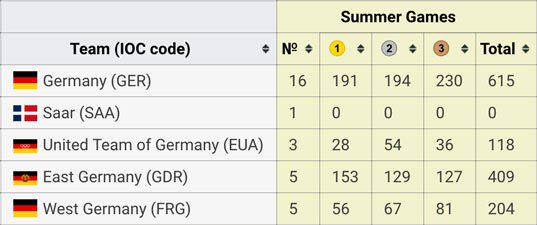
Russia and the Soviet Union
The Russian Federation, the Russian Empire and the Olympic Athletes from Russia are often combined outside of IOC sources. The Soviet Union is sometimes combined with the post-union team that competed in 1992. No sources combine the Soviet Union and Russia as many republics which subsequently gained or re-gained independence (Armenia, Azerbaijan, Belarus, Estonia, Georgia, Kazakhstan, Kyrgyzstan, Latvia, Lithuania, Moldova, Tajikistan, Turkmenistan, Ukraine and Uzbekistan) contributed to the medal tally of the USSR.
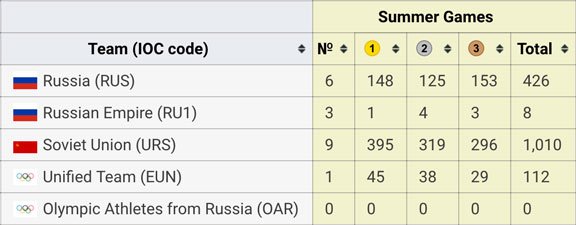
Serbia and Yugoslavia
The Olympic Committee of Serbia, created in 1910 and recognized in 1912, is deemed the direct successor to both Yugoslav Olympic Committee and the Olympic Committee of Serbia and Montenegro by IOC, and therefore the inheritor to all the records of the defunct nations. In the period from 1920 to 2006, athletes representing these defunct countries won a total of 95 medals at Summer Games.
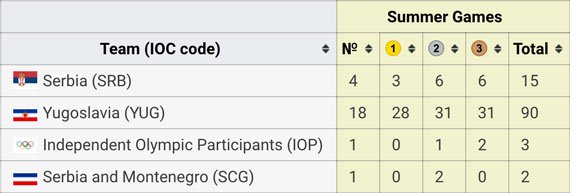
Source: Vemaps.com
